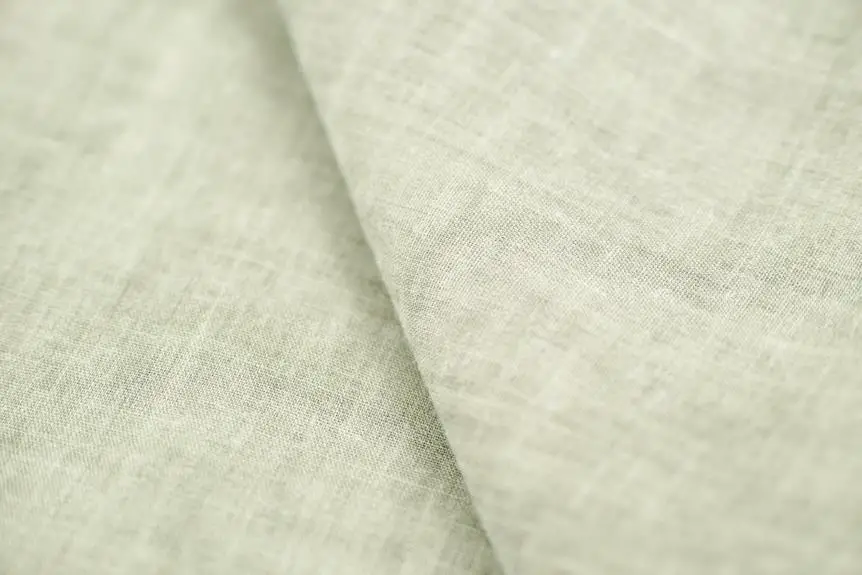When you touch Supima cotton, you might wonder what makes it feel so incredibly soft. It's not just about the feel; the science behind its softness is fascinating. You'll find that its longer fibers play a crucial role, but that's only the beginning. The methods used to cultivate and process this cotton also contribute significantly to its luxurious texture. As you explore further, you'll uncover how these factors work together to create a fabric that stands apart from regular cotton. What other secrets does Supima hold?
Table of Contents
What Is Supima Cotton?
Supima cotton is a premium type of cotton that's known for its exceptional softness and durability. It's a trademarked brand of American Pima cotton, which is grown exclusively in the United States. When you choose Supima cotton, you're opting for a product that's cultivated under strict quality standards, ensuring its superior quality compared to regular cotton.
This type of cotton is characterized by its longer fibers, which contribute to its luxurious feel and enhanced strength. You'll notice that fabrics made from Supima cotton resist fraying, fading, and wrinkles more than those made from standard cotton. Its unique properties make it a favorite among manufacturers of high-end apparel, bed linens, and towels.
When you wear or use items made from Supima cotton, you'll experience a remarkable softness against your skin, making it ideal for everyday wear. Plus, its durability means that your Supima cotton products will last longer, providing you with both comfort and value.
Fiber Length and Softness
The longer fiber length of Supima cotton directly contributes to its remarkable softness, making it a top choice for luxurious textiles. When you touch Supima cotton, you can immediately feel the difference. Its fibers, which are about 1.5 inches longer than those of regular cotton, create a smoother surface. This means fewer rough edges and less friction against your skin, resulting in an incredibly soft feel.
Longer fibers also allow for tighter spins, which enhances the overall durability of the fabric without sacrificing comfort. You'll notice that when you wash Supima cotton, it retains its plushness and doesn't pill like other fabrics. This durability means it can withstand repeated use while still providing that soft touch you love.
Moreover, the longer fibers help to create a more uniform fabric, which not only looks better but feels better too. You really can't underestimate the impact of fiber length on the overall experience of wearing or using cotton products.
Cultivation Techniques
Growing Supima cotton involves specialized cultivation techniques that maximize its fiber quality and softness. To achieve this, you need to start with high-quality seeds, as Supima cotton is derived from the Pima variety, known for its long fibers. Planting in well-drained soil with the right pH ensures optimal growth.
When it comes to irrigation, maintaining consistent moisture levels is crucial. Over or under-watering can stress the plants and diminish fiber quality. Additionally, you're encouraged to utilize crop rotation and integrated pest management to maintain soil health and reduce pests naturally.
Fertilization plays a significant role too. By applying the right nutrients at the right times, you can promote robust plant growth and enhance fiber yield. This balance prevents the cotton from becoming overly lush, which can negatively impact fiber strength.
Lastly, monitoring weather conditions is essential. Temperature and humidity can affect flowering and fiber development, so you'll need to be attentive.
Processing Methods
Processing methods play a crucial role in preserving the softness and quality of Supima cotton fibers. Once harvested, the cotton goes through a series of carefully controlled steps.
First, it's ginned to separate the fibers from the seeds. This process ensures minimal damage to the fibers, which keeps them long and strong.
Next, the fibers undergo a cleaning process to remove any impurities. This step is vital because any leftover debris can impact the final softness of the fabric.
After cleaning, the fibers are carded and spun into yarn. During spinning, manufacturers pay close attention to tension and twist, as these factors influence the overall feel of the fabric.
Dyeing and finishing follow, where gentle methods are employed to enhance the softness without compromising quality. For instance, using low-impact dyes can help maintain the natural characteristics of the fibers.
Benefits of Supima Cotton
Supima cotton offers a range of benefits that make it a top choice for those seeking luxurious and durable fabrics.
First and foremost, its exceptional softness provides a level of comfort that standard cotton just can't match. You'll notice this softness immediately, whether you're wearing a Supima cotton t-shirt or snuggling up in a bed made of Supima sheets.
In addition to its plush feel, Supima cotton boasts remarkable strength. The long fibers resist fraying, fading, and tearing, ensuring your garments and linens will last much longer than those made from regular cotton. This durability means fewer replacements and ultimately saves you money.
Another significant advantage is its vibrant color retention. Supima cotton absorbs dye more effectively, giving you richer colors that hold their brilliance wash after wash. You won't have to worry about your favorite shirt losing its luster.
Lastly, Supima cotton is also more environmentally friendly. Its cultivation typically uses less water and fewer pesticides than other cotton types, making it a sustainable choice. By choosing Supima, you're investing in quality for yourself and making a positive impact on the planet.
Frequently Asked Questions
Is Supima Cotton Environmentally Friendly Compared to Regular Cotton?
Supima cotton is generally more environmentally friendly than regular cotton. It's grown using sustainable practices, requires less water, and produces higher yields. Choosing Supima can help reduce your environmental impact while enjoying quality products.
How Does Supima Cotton Compare to Other Luxury Fabrics?
When you compare Supima cotton to other luxury fabrics, you'll find it boasts superior softness, durability, and color retention. It outshines many alternatives, offering a unique balance of comfort and elegance in your wardrobe choices.
Can Supima Cotton Be Machine Washed?
Yes, you can machine wash Supima cotton. Just use cold water and a gentle cycle to preserve its quality. Avoid bleach and opt for mild detergents to keep your fabric looking its best longer.
What Colors Are Available for Supima Cotton Products?
You'll find Supima cotton products in a variety of colors, from classic whites and neutrals to vibrant shades like cobalt blue, emerald green, and soft pastels. There's something to match every style and preference!
How Can I Identify Authentic Supima Cotton?
To identify authentic Supima cotton, look for the Supima label on products. Check for a certification mark and feel the fabric's softness; genuine Supima has a luxurious, smooth texture that sets it apart from regular cotton.
- How Does Ring Spun Cotton Affect Garment Fit and Shape Retention? - August 13, 2024
- What Are the Challenges in Producing Ring Spun Cotton? - August 13, 2024
- Is Ring Spun Cotton Suitable for Plus-Size Clothing? - August 13, 2024







